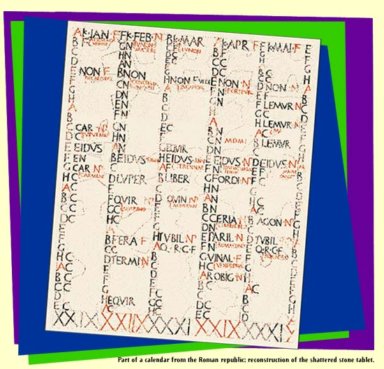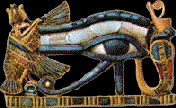Ever wonder how 

You probably already know the ancient Egyptians were the first to detail time in a more refined measured system, based on the flooding of the Nile and the rotation of the earth around the sun. Our star, the sun, we named "Sol" which is why we call it a SOLar year. There is only one "sol-ar" system because only one star is named Sol. So anyway....
Our calendar grows more inaccurate with each passing year, since the earth's rotation has slowed and time is marked without this consideration. Some cultures, like Islam, determine their year based not on the sun's rotation but the lunar cycle.

The moon was unimportant to the ancient Egyptians; their only seasonal concern was the flooding of the Nile and thus developed a 365-day year. It did not remain so, however.

Beginning of Roman year:
"Martius" (March) named for Mars, god of war
"Aprilis" (April) signifying the beginning or blossoming - "aperire" in Latin means "to open"
"Maius" (May) named for goddess of fertility
"Junius" (June) named for goddess of the moon
"Quintillus" (July) is #5 in Latin, for 5th month
"Sextilis: (August) is #6, for 6th month
"September" (same) is #7, for 7th month
"October" (same) is #8, for 8th month
"November" (same) is #9, for 9th month
"December" (same) is #10, for 10th month
"Januarius" (January) named for god of gateways
"Februarius" (February) festival of purification
Two of these months would change during the reigns of Emperors Quintillus and Sextilis, becoming July and August. They would each have 31 days because there were holy days during each, honoring Julius Caesar and Augustus Caesar. This still holds true today.

The Julian Calendar also ushered in some changes by way of Julius. The Roman calendar has 355 days and the solar year was 365.25 days. To correct it, the Romans added an extra month every other year. This worked somewhat for awhile, but it made the Roman year longer than the solar year. So Julius Caesar commissioned a Greek astronomer to fix the problem and after much calculation, adding and subtracting, we have the leap year.

Caesar was pleased with the new calendar but the Roman year was by now so out of line with the seasons, he had to affect drastic change. In 46 BC he added 67 days between November and December. This resulted in a year that lasted 445 days. It would be the standard calendar in Europe until the 16th century and Pope Gregory VIII. (Hence the naming of today's 12-month calendar "Gregorian").

Here's something interesting: We use the initials "BC" to show time "before Christ" and "AD" to show time "anno dominae" or "year of Our Lord", which is the start of the year 1. It is called the first year to show time beginning when Christ was said to walk the earth. Otherwise, our year would look very different; think of the Chinese system of keeping time using the approximate start of their civilization over 5000 years ago. Only "most" of the world uses BC and AD. If you call a year BCE it means "Before the Common Era" and CE which means "Common Era". It refers to time without making allusion to religion.


Those initials lead to a very important fact: the birth of Christ. The Roman calendar of marking time was used in the early years of Christianity. This lasted until the end of the reign of Emperor Diocletian, which lasted until the 6th century BCE when a monk named Dionysis Exegesis set out to date the
By moving backward from Diocletian's reign, he was able to place the birth at December 25, 753 CE. This date, therefore would be the beginning of the year 1 CE, or as we mark it, AD (year of Our Lord) In Medieval times, Christmas and New Year was the same day. Although used for centuries,we now know he was completely inaccurate. Jesus Christ obviously could not have been born after 4 BCE. However, his standard of dating is still used all over the world. we also use BCE (Before the Common Era) and CE (Common Era) in place of the traditional BC and AD as explained earlier.
There is serious talk
Someday soon we may be using a very different calendar, but for now the Gregorian time-keeper has a secure place.


















































11 comments:
WOW!!! You've done some studying.... this is very interesting!! A 13 month calendar, huh?!! WOW!! That would make me four years younger??? or something.
Joann
Thanks for that...It was really really interesting. I knew a lot of it but by no means all these facts. Thanks again. Love Sybilx
Brilliant My Starlady. I loved the whole entry. Love Pam xx
very interesting I didn't know all that ..
hugs
Sherry
I enjoyed this entry. I admit it wasn't something I gave a lot of indepth thought to and may of just taken for granted. It's nice to know where it began and may now go with the 13 month calendar. (Hugs) Indigo
thats very interesting, If they do make 13 months I wonder what they would call it.
I enjoyed this entry a lot. I find the development of civilization fascinating. From what I've read, from what I gathered from what I read, religion plays a part in so much. The development of the calendar is no surprise. It was so tied to growing season, and from what I gathered, the success of those seasons were dependent on what god was appeased and what god was angry.
I think that with every day that passes and with every issue before us, we move closer to globalization. Where I've never thought about the development of a new calendar, it certainly makes sense.
Jude
http://journals.aol.com/jmorancoyle/MyWay
I knew about the history of our calendar from the romans but didn't know the information about the Nile from the Egyptians. That is very interesting. As far as a 13 month calendar with a World Holiday, I haven't heard of that. I don't think I would like a change like that. The way we as humans understand time would be changed and I think that could cause a lot of confusion. I know I would personally be very uncomfortable with it. If I go to another time zone, I compare their time to the time I'm used to so that it makes sense to me. Hope you have a great day. (((HUGS))) -Missy http://journals.aol.com/ma24179/MISSYZSTUFF
I knew bits and pieces of this. Thanks for filling in the blanks. ;o) - Barbara
Well done, Cathy.... I didn't know all the facts! and btw, I finally added your photo to my journal sidebar... sorry for the delay! bea
Мы с мужем знакомы с 19 лет. Любили друг друга. Поженились в 24. После одних моих резких слов он развернулся и ушел. Потом выяснилось: встретил девушку, красавицу, понимающую, желающую разделить с ним всю жизнь. С ней он сошелся с уверением, сколько его семейная содержание закончилась, т.к. понимания взаимного отсутствует давно. Я его выгнала, я не выдержала той низости слов, что он любит и тут и тут, и не может определиться. Я внешне спокойна, около нем улыбаюсь, весь хорошо выгляжу, слежу после собой, всетаки успеваю с ребенком. И в то же время я не могу найти успокоения и душевного комфорта и очень почасту накатывает волна слез... отчаяния и тоски. [url=http://tutledy.ru/raznoglasiya-s-muzhchinoy.html]разногласия с мужчиной[/url]
Post a Comment